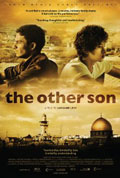
France/Israel 2012
Directed by
Lorraine Levy
105 minutes
Rated M
Reviewed by
Sharon Hurst

The Other Son
Synopsis: When a young man goes for his Israeli army medical a blood test leads to the revelation that although raised as an Israeli-Jew, 18 year old Joseph Silberg (Jules Sitruk) is not the biological child of Orith (Emanuelle Devos) and Alon (Pascal Elbe) but rather the son of Palestinians, Leila (Areen Omari) and Said (Khalifa Natour) who have raised Orith and Alon’s son as Yacine Al Bezaaz (Mehdi Dehbi). It turns out that on the night of their birth in a Haifa hospital during an evacuation due to the threat of an Iraqi missile attack the two babies were accidentally switched.
The ramifications of a scenario such as is portrayed by Lorraine Levy’s film are shattering especially when the two families come from such bitterly opposed peoples. Rare as it is, there are documented cases of such a dramatic mistake. The issue here is how the director (who is also the screenwriter) handles such potentially fraught and melodramatic subject matter. The good news is she handles it with sensitivity, intelligence and depth of emotion that is truly affecting.
Issues of identity are essential here and it doesn’t take a genius to figure how devastating it would be for a Jewish boy to discover he really is of an Arab family and vice-versa. How the boys handle the revelation is one thing; how the fathers, as opposed to the mothers, deal with it is another. With a female director, we get a perspective that is weighted sympathetically towards a female reaction – the two mothers seem to have it in their hearts to embrace their new-found son, love him even, while still loving the one they have raised. The men, however, are more resistant. They easily fall to bickering over politics, raising the same old issues that have led to warfare over the millennia. Yacine’s belligerent brother Bilal (Mahmud Shalaby) does a spontaneous switch from brotherly love and camaraderie to near-hatred the minute he realises the genetic origins of the boy he has grown up with. Joseph’s rabbi throws another spanner in the works telling the boy his identity will now have to undergo a formal conversion. Through these various perspectives the film asks the critical questions of who are we and what is more influential to our identity - nature or nurture?
Of course the political is also crucial to the situation. We see the physical wall dividing Israel and Palestine, the endless checkpoints and the blatant disparity between life in the Jewish side of the country, with its freedom and affluence, and the poverty on the Palestinian side. Full credit however goes to Levy for avoiding a stereotypical portrait of Arab society whilst her choice of dramatic turning point is cleverly chosen so as to be something that an audience might not expect.
I found myself in awe of the acting. Every performance projects truthfulness with both mothers simply winning in their portrayal of what it means to love a child. The overriding feeling is one of compassion and reconciliation. The fact that four languages are spoken through the film is a softening element whilst music also plays an important role in breaking down barriers.
The director could have opted for an either/or outcome but instead arrives at a compromise that no doubt reflects her optimism. Maybe it is a bit of a tall order, even a dream, but the way the characters choose to resolve their situations feels right and inspires hope for what is a seemingly-irresolvable situation.
Hopefully this life-affirming film will be seen and appreciated by many people but especially hard-nosed Zionists and their equally hard-nosed opponents.

Want more about this film?


Want something different?




